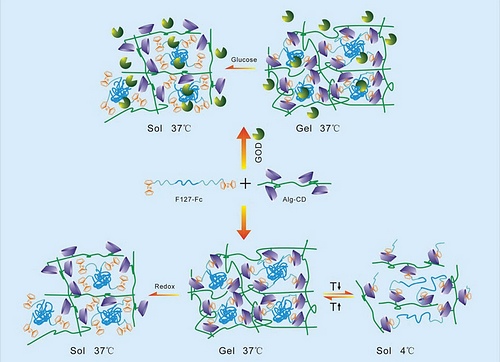
In this study, researchers develop a novel reversible hydrogel that is responsive to temperature, redox, and glucose. Because the building blocks, b-cyclodextrin grafted alginate (Alg-b-CD), and Fc modified pluronic F127 (F127-Fc), are biocompatible, this hydrogel shows great potential in medical applications.The Alg-b-CD and F127-Fc were synthesized according to the literature,10,11 and the degree of substitution was 12.4% and 24.3%, respectively (the preparation and characterization are provided in theESI†).
Researchers from Chengdu Institute of Biology, Chinese Academy of Sciences successfully constructed a novel supramolecular hydrogel, which contained two kinds of crosslinkers, thermally induced F127-Fc micelles and Fc-b-CD inclusions. The obtained hydrogel showed a reversible sol–gel–sol phase transition in response to temperature and chemical oxidization. Furthermore, good glucose responsiveness was achieved after immobilizing GOD.
This research demonstrated a kind of biocompatible hydrogel composed of alginate-g-b-cyclodextrin (Alg-b-CD) and ferrocene-terminated pluronic F127 (F127-Fc), which showed gel–sol phase transformations in response to temperature, oxidizing agents, and glucose because of the reversible association–dissociation of Fc-b-CD inclusions and F127 micelles.
This work was funded by the National Natural Science Foundation of China (Grant No. 21074138 and 51073107), the CAS Knowledge Innovation Program (Grant No.KSCX2-EW-J-22) and the Program
for Changjiang Scholars and Innovative Research Team at the University of Ministry of Education of China (IRT1026) and the CAS Special Grant for Postgraduate Research, Innovation and
Practice (2010).
